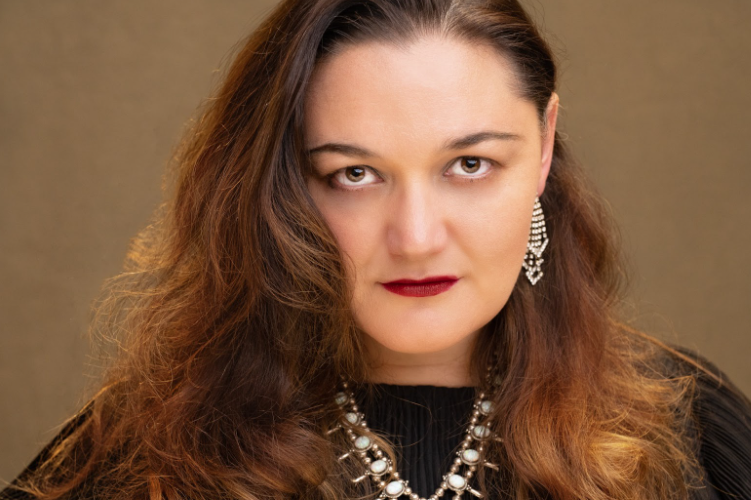
- Details
- By Kaili Berg
This June, Mission Opera will close its seventh season with the production of Tosca. For the first time in the company’s history, all three principal roles in an evening cast are being performed by Indigenous artists.
Presented by Mission Opera in Santa Clarita, California, the production features Kirsten Kunkle, a Muscogee Nation citizen, in the title role, alongside Tiwa tenor Hugo Vera as Cavaradossi and Chickasaw baritone Gabriel Manro as Scarpia.
“I truly never thought this would happen in my lifetime,” Kunkle told Native News Online. “To have three Indigenous artists leading a production of Tosca, it’s exciting, it’s powerful, and it’s something we want our communities to see.”
For Kunkle, this role is deeply personal. She first encountered Tosca at 13 years old, cast in the adult chorus of a now defunct opera company in Michigan.
“It’s a full-circle moment for me,” Kunkle said. “Tosca has always been a bucket list role. She’s an opera singer, she’s passionate, and she’s complicated. You see her go through jealousy, rage, heartbreak, everything. It’s a dream to finally bring her to life.”
Kunkle previously performed with Vera in the 2022 world premiere of Loksi’ Shaali’ (“Shell Shaker”), the first opera sung in the Chickasaw language. The two will reunite in Tosca as lovers, though the storyline ends far less romantically.
“This time I’ll be stabbing the villain, played by Gabriel, in Act II,” Kunkle said. “But we’re all looking forward to it. There’s a real camaraderie between us.”
While the opera is fully rooted in Puccini’s classic 19th-century setting, this production brings a modern twist, with multimedia staging, a 48-foot LED backdrop, and a live orchestra.
Directed by Justine Prado Manro and conducted by Brian Stone, the show runs June 13–15 at the Canyon High School Performing Arts Center.
Beyond the music, Kunkle hopes the production helps shift how people see opera and who belongs in it.
“Opera can feel intimidating to people. But this is for everyone,” Kunkle said. “We’re proof that Indigenous performers belong in these spaces. We’re showing what’s possible, not just for our tribes, but for the next generation. Whether they want to perform, direct, or just enjoy it, there’s a place for them here.”
Mission Opera originally invited Kunkle to perform in the West Coast premiere of Girondines, an opera she co-created with composer Sarah Van Sciver. She was drawn to the company’s focus on outreach, student mentorship, and accessible productions.
“It’s not just about putting on great opera, it’s about building community and giving people a chance to grow,” Kunkle said.
As for what audiences should expect from Tosca? “I hope they love it,” Kunkle said. “But more than that, I hope they see the power of representation. We’re not just here, we’ve been here. And we’re only getting started.”
More Stories Like This
Zuni Youth Enrichment Project Takes Top Emerging Artist Apprentices to Phoenix for Artistic Exploration and Cultural ImmersionFrom Dishwasher to Award-Winning Chef: Laguna Pueblo's Josh Aragon Serves Up Albuquerque's Best Green Chile Stew
Rob Reiner's Final Work as Producer Appears to Address MMIP Crisis
Vision Maker Media Honors MacDonald Siblings With 2025 Frank Blythe Award
First Tribally Owned Gallery in Tulsa Debuts ‘Mvskokvlke: Road of Strength’
Help us defend tribal sovereignty.
At Native News Online, our mission is rooted in telling the stories that strengthen sovereignty and uplift Indigenous voices — not just at year’s end, but every single day.
Because of your generosity last year, we were able to keep our reporters on the ground in tribal communities, at national gatherings and in the halls of Congress — covering the issues that matter most to Indian Country: sovereignty, culture, education, health and economic opportunity.
That support sustained us through a tough year in 2025. Now, as we look to the year ahead, we need your help right now to ensure warrior journalism remains strong — reporting that defends tribal sovereignty, amplifies Native truth, and holds power accountable.
 The stakes couldn't be higher. Your support keeps Native voices heard, Native stories told and Native sovereignty defended.
The stakes couldn't be higher. Your support keeps Native voices heard, Native stories told and Native sovereignty defended.
Stand with Warrior Journalism today.
Levi Rickert (Potawatomi), Editor & Publisher


